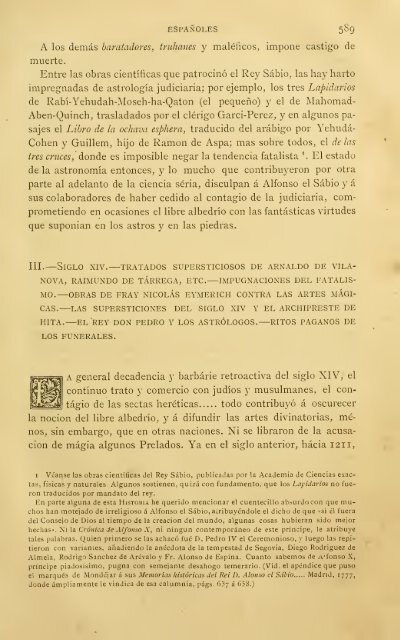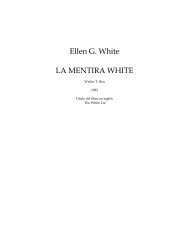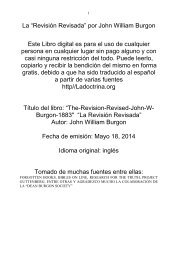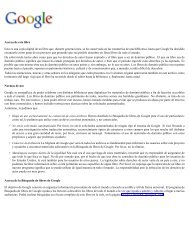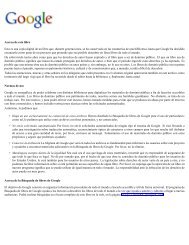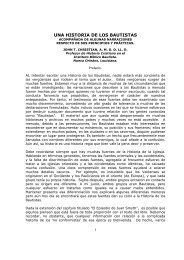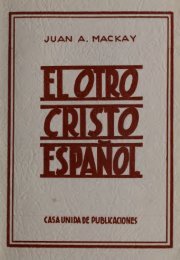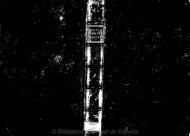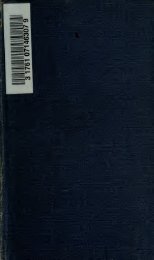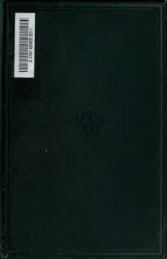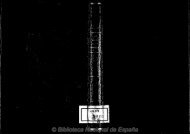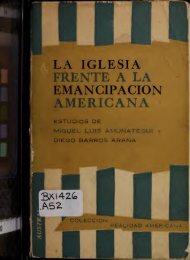- Page 1:
'í v-* \^ '••': 'm^ ',-..:W^ '
- Page 5:
HISTORIA DE LOS HETERODOXOS ESPAÑO
- Page 8 and 9:
^^l"] ^-o 3R í MADRID: 1880.—Imp
- Page 11 and 12:
DISCURSO PRELIMINAR L comenzar el p
- Page 13 and 14:
de allende. Sin embargo, de Servet
- Page 15 and 16:
ESPAÑOLES 11 decir, que en el libr
- Page 17 and 18:
. • ESPAÑOLES 13 Wiffen y de Us
- Page 19 and 20:
• HSPANOLES 15 denada por nuestro
- Page 21 and 22:
• ^ ESPAÑOLES 17 la circulación
- Page 23 and 24:
, —1 : ESPAÑOLES - ig dor D. Vic
- Page 25 and 26:
ESPAÑOLES . ^i cias, etc. Todo ir
- Page 27 and 28:
ESPAÑOLES 23 hacia las personas, s
- Page 29 and 30:
ESPAÑOI.ES .. 25 Julianillo Herná
- Page 31 and 32:
ESPAÑOLES 'P] (y han juzgado algun
- Page 33 and 34:
ESPAÑOLES 29 tos cuando aparezcan
- Page 35 and 36:
F.SPAÑOLES 31 Otra tribulación ex
- Page 37 and 38:
ESPAÑOLES 33 más que algunos nomb
- Page 39 and 40:
i:SPA.\OT.ES ;,5 Diaz y Jaime de Tv
- Page 41 and 42:
.. • ' ESPAÑOLES 37- W culminant
- Page 43:
ESPAÑOLES 39 En lo demás, ahí es
- Page 46 and 47:
42 HETERODOXOS Qué religiones hab
- Page 48 and 49:
4;. HETERODOXOS de todo sistema pan
- Page 50 and 51:
— ,j(i a HiíTiikonoxos Las colon
- Page 52 and 53:
4S HETERODOXOS venida de Santiago,
- Page 54 and 55:
^ 50 j]i:t]irodo\os Carteya, y h Se
- Page 56 and 57:
52 iii:tj:küdoxüs A los ocho dias
- Page 58 and 59:
54 HETERODOXOS Título nuevo, de pe
- Page 60 and 61:
jG HETERODOXOS hace á nuestra Pen
- Page 62 and 63:
¿o liinjiRODOXOS fáciles y contin
- Page 64 and 65:
"•' Osio, sólo uno de estos Obis
- Page 66 and 67:
h2 lllii li-RODOxOS Las malas artes
- Page 68 and 69:
1 Véanse MI 111-. i hKOlH/XUS tore
- Page 70 and 71:
atribuye 66 HETERODOXOS naje al'jun
- Page 72 and 73:
68 HETERODOXOS de los legados del P
- Page 74 and 75:
O HETERODOXOS bir lecciones de noso
- Page 76 and 77:
72 HETERODOXOS zar un texto por mer
- Page 78 and 79:
I 74 HETEKOiJOXOS ducirse, siquiera
- Page 80 and 81:
76 HETERODOXOS (Obispo de Mérida),
- Page 82 and 83:
7^ HETERODOXOS VI,— Los DONATISTA
- Page 84 and 85:
*8o HETERODOXOS deña, fué más le
- Page 86 and 87:
— — 82 HETERODOXOS CAPITULO II
- Page 88 and 89:
84 HETERODOXOS aparte ó le tuercen
- Page 90 and 91:
86 HETERODOXOS nado; los Sephirot,
- Page 92 and 93:
88 HETERODOXOS Pistis Sophia, atrib
- Page 94 and 95:
go HETERODOXOS ferior: de él emana
- Page 96 and 97:
' 92 HETERODOXOS Continuaron los di
- Page 98 and 99:
94 HETERODOXOS Sopliia. Y aquí com
- Page 100 and 101:
96 HETERODOXOS suelta á todos los
- Page 102 and 103:
^8 HETERODOXOS origen del mal '. A
- Page 104 and 105:
loo HETERODOXOS III.— Historia de
- Page 106 and 107:
103 HETERODOXOS menzó Idacio á pr
- Page 108 and 109:
104 HETERODOXOS que era compra y ve
- Page 110 and 111:
I06 HETERODOXOS recriuiinaciones, s
- Page 112 and 113:
108 HETERODOXOS na cuenta quedaron
- Page 114 and 115:
lio HETERODOXOS Y aquí tocamos con
- Page 116 and 117:
112 HETERODOXOS cío, cuyo nombre o
- Page 118 and 119:
ll.l. HETERODOXOS donde se negó á
- Page 120 and 121:
Il6 HETERODOXOS Obispo, y no los pr
- Page 122 and 123:
IlS HETERODOXOS extenderse la esenc
- Page 124 and 125:
» 120 HETERODOXOS y á Paterno, qu
- Page 126 and 127:
122 HETERODOXOS Cerca de la mitad d
- Page 128 and 129:
124 HETERODOXOS »Si alguno cree, c
- Page 130 and 131:
La Occultandae 126 HETERODOXOS las
- Page 132 and 133:
128 HETERODOXOS liano: i." si el cu
- Page 134 and 135:
— 130 HETERODOXOS quitó los resa
- Page 136 and 137:
132 HETERODOXOS de la perla y la pl
- Page 138 and 139:
134 HETERODOXOS Has de volver, huma
- Page 140 and 141:
136 HETERODOXOS nos. Sólo de uno d
- Page 142 and 143:
I ¿5 HETERODOXOS lictiUi tempus ex
- Page 144 and 145:
140 HETERODOXOS Ningún pesimista m
- Page 146 and 147:
142 IIRTI'RODOXOS cado. Agregúese
- Page 148 and 149:
144 HETERODOXOS goza, y que eran ig
- Page 150 and 151:
146 HETERODOXOS gia y la astrologí
- Page 152 and 153:
' 148 HRTKRÓbOXO.^ SOS de la vida
- Page 154 and 155:
150 HETERODOXOS ideas, pero en sent
- Page 156 and 157:
T52 HETERODOXOS IX.— Polémica te
- Page 158 and 159:
.'^ 154 HETERODOXOS ñol habia reda
- Page 160 and 161:
• AucUit 156 HETERODOXOS ( que de
- Page 162 and 163:
158 HETERODOXOS del del Evangelio,
- Page 164 and 165:
l6ñ HETERODOXOS aplica á todo pri
- Page 166 and 167:
l62 HETERODOXOS No me atrevo á inc
- Page 168 and 169:
164 HETERODOXOS ideas, cortándose
- Page 170 and 171:
1 Historia .i Traducción de Masdeu
- Page 172 and 173:
1 «Quia I 68 ' HETERODOXOS primera
- Page 174 and 175:
170 HETEKODHXOS consulta á San Cap
- Page 176 and 177:
1 Suevorum 172 HETERODOXOS V.— El
- Page 178 and 179:
174 HETERODOXOS dignó salvarlos Y
- Page 180 and 181:
I 176 llF.TRRODOxrm VI.— El arria
- Page 182 and 183:
178 IIETRRODOXOS VIL—EL ARRIANISM
- Page 184 and 185:
l8o HETERODOXOS Supo con dolor Leov
- Page 186 and 187:
I Vitae I 8^ . HETERODOXOS Mausona,
- Page 188 and 189:
dice jS4 heterodoxos VIII.— Escri
- Page 190 and 191:
l86 • HETERODOXOS distinguimos bi
- Page 192 and 193:
I 88 HETERODOXOS IX.— Abjuran los
- Page 194 and 195:
I()0 HF.TP.ROnOXOS que siguiendo n
- Page 196 and 197:
192 HETERODOXOS sion de nuestro goz
- Page 198 and 199:
ig4 HETERODOXOS el Jansenismo, ni p
- Page 200 and 201:
ig6 HETERODOXOS y en sus hijos, ó
- Page 202 and 203:
1 Vid. ig8 HETERODOXOS iglesia, sen
- Page 204 and 205:
1 •Apocalypsim 200 HETERODOXOS ^\
- Page 206 and 207:
1 He 203 HETERODOXOS «Cumple bien
- Page 208 and 209:
204 HETERODOXOS Entrambas son conse
- Page 210 and 211:
2o6 HETERODOXOS nada ni se habían
- Page 212 and 213:
2oS HETERODOXOS ciones del Arrianis
- Page 214 and 215:
210 HETERODOXOS gelio en que hacian
- Page 216 and 217:
212 ITKTl'RODOXOR cir algún amante
- Page 218 and 219:
214 PIETERODOXOS moderaba la potest
- Page 220 and 221:
2l6 HETERODOXOS una sola gente. El
- Page 222 and 223:
— — — — — 2l8 HETERODOXOS
- Page 224 and 225:
. 22(} HETERODOXOS vertimos que esa
- Page 226 and 227:
222 HETERODOXOS y vaticinan con la
- Page 228 and 229:
2 24 IIETP.RODOXOS la ley del fatnm
- Page 230 and 231:
226 HETERODOXOS dora es Medea, dist
- Page 232 and 233:
; 226 HETERODOXOS pulos de Osthanes
- Page 234 and 235:
230 HETERODOXOS venidas de Etruria
- Page 236 and 237:
: 232 HETERODOXOS Tibulo practicaba
- Page 238 and 239:
• .'i Sobre 234 HETERODOXOS la ad
- Page 240 and 241:
236 • HETERODOXOS grafo Baudemand
- Page 242 and 243:
23^^ HETERODOXOS do entre las reses
- Page 244 and 245:
240 HETERODOXOS Y sal de los Húmal
- Page 246 and 247:
242 HETERODOXOS Entre los antiguos
- Page 248 and 249:
' 244 HETERODOXOS en que se atribuy
- Page 250 and 251:
. Gentik ainadovs ' 246 HETERODOXOS
- Page 252 and 253:
: 24S HETERODOXOS el privilegio de
- Page 254 and 255:
cual 250 HETERODOXOS suelo SUS resp
- Page 256 and 257:
252 HETERODOXOS SUS aguas. Al imper
- Page 258 and 259:
' 254 HETERODOXOS Merece, iinalment
- Page 260 and 261:
2=^6 HETERODOXOS por ellos adivinad
- Page 262 and 263:
258 HETERODOXOS compuso San Martin
- Page 264 and 265:
26o HETERODOXOS nen larga enumeraci
- Page 266 and 267:
203 HETERODOXOS quiera que profese
- Page 268 and 269:
264 HüTEKÜDOXOS Otras supersticio
- Page 270 and 271:
266 HETERODOXOS ron de pensar los c
- Page 272 and 273:
con 268 lili riiKODoxos II.— Atis
- Page 274 and 275:
270 HETERODOXOS Fuera de este punto
- Page 276 and 277:
. 272 HETERODOXOS el celo de la fé
- Page 278 and 279:
274 HETERODOXOS siglo IX, autor de
- Page 280 and 281:
1 -Cujus 276 HETERODOXOS Heterio, m
- Page 282 and 283:
278 HETERODOXOS mos la carta de tu
- Page 284 and 285:
28o HETERODOXOS Muéstrase Beato h
- Page 286 and 287:
«Spiritus 202 HETERODOXOS naturale
- Page 288 and 289:
284 HETERODOXOS y arrancó los desp
- Page 290 and 291:
285 HRTEROnOXOS para condenar á F
- Page 292 and 293:
288 IIF.TERODOXOS dad castigada, y
- Page 294:
290 'llF.TRRODOXOS Dei tdtimus serv
- Page 297 and 298:
ESPAÑOLES 293 Por semejante estilo
- Page 299 and 300:
1 • In ,^ ESPAÑOLES 295 saba el
- Page 301 and 302:
1 Ducange está en un latin sumamen
- Page 303 and 304:
ESPAÑOLES 299 Huic ad cathülici d
- Page 305 and 306:
ESPAÑOLES 301 abad Calordo y á lo
- Page 307 and 308:
. ESPAXOLKS 303 II.—La regeneraci
- Page 309 and 310:
ESPAÑOLES 305 Uelcrio y Beato: Lí
- Page 311 and 312:
ESPAÑOLES 307 entonces se denomina
- Page 313 and 314:
ESPAÑOLES 309 se, ni bastante para
- Page 315 and 316:
ESPAÑOLES 311 tres libros del Memo
- Page 317 and 318:
1 .Condemnamus «Jjcti. íSfe,!,':'
- Page 319 and 320:
ESPAÑOLES 315 muzárabes. Instaba
- Page 321 and 322:
ESPAÑOLES 317 dura cerviz. «Tu le
- Page 323 and 324:
ESPAÑOLES 319 dignidad, usóla cad
- Page 325 and 326:
ESPAÑOLES 321 habia caído tribula
- Page 327 and 328:
ESPAÑOLES 323 cios eclesiásticos,
- Page 329 and 330:
ESPAÑOLES ó^:) procuramos apartar
- Page 331 and 332:
ESPAÑOLES 327 VI.— El «apologé
- Page 333 and 334:
ó ESPAÑOLES 329 veniente, por cie
- Page 335 and 336:
ESPAÑOLES 331 in útero Virginis,
- Page 337 and 338:
ESPAÑOLES 333 remos, excitadas á
- Page 339 and 340:
ESPAÑOLES 335 y de los Apóstoles.
- Page 341 and 342:
te confesamos querer conservar las
- Page 343 and 344:
ESPAÑOLES 339 FeliiK in quodam dis
- Page 345 and 346:
. ESPAÑOLES 341 Redención, y con
- Page 347 and 348:
ESPAÑOLES 343 ciar ó abominar á
- Page 349 and 350:
' Le acrimina asimismo de mal gram
- Page 351 and 352:
ESPAÑOLES 347 Parece que vValafrid
- Page 353 and 354:
ESPAÑOLES 349 El Cardenal Angelo M
- Page 355 and 356:
ESPAÑOLES 451 Angelo Mai, en el to
- Page 357 and 358:
ESPAÑOLES 353 IV.— Vindicación
- Page 359 and 360:
— — . ESPAÑOLES 355 Sostenía
- Page 361 and 362:
ESPAÑOLES 357 mana. En el De divin
- Page 363 and 364:
ESPAÑOLES ;:;5f) pecar, para que p
- Page 365 and 366:
ESPAÑOLES 361 nes salta á la vist
- Page 367 and 368:
ESPAÑOLES 363 mano (lo cual no tod
- Page 369 and 370:
ESPAÑOLES 365 LIBRO III PREÁMBULO
- Page 371 and 372:
F.SPAÑOLES 367 del Papa Honorio.,
- Page 373 and 374:
gio de D. Sancho, puesto que éste
- Page 375 and 376:
ESPAÑOLES 371 Sahagun, que, á pes
- Page 377 and 378:
ESPAÑOLES 373 juriosü y simoniaco
- Page 379 and 380:
— — — ESPAÑOLES 375 CAPITULO
- Page 381 and 382:
ESPAÑOLES • 377 trina enterament
- Page 383 and 384:
ESPAÑOLES 379 De anima, es una de
- Page 385 and 386:
ESPAÑOLES 381 res caracteres en Es
- Page 387 and 388:
ESPAÑOLES 383 fluencia en ciertas
- Page 389 and 390:
ESPAÑOLES 385 y filosófico, flore
- Page 391 and 392:
ESPAÑOLES 387 En cambio Saadía, a
- Page 393 and 394:
ESPAÑOLES 389 Avicebron. O untes i
- Page 395 and 396:
I ESPAÑOLES 39 del mundo. En Teodi
- Page 397 and 398:
to, ESPAÑOLES 393 y 10.*^ Reino. D
- Page 399 and 400:
ESPAÑOLES 395 de vSéneca y Apuley
- Page 401 and 402:
ESPAÑOLES 397 tino, códice del si
- Page 403 and 404:
. ESPAÑOLES 399 adelante del códi
- Page 405 and 406:
ESPAÑOLES 401 El segundo tratado s
- Page 407 and 408:
: ESPAÑOLES 403 Dios las unió par
- Page 409 and 410:
ESPAÑOLES 405 daron los traductore
- Page 411 and 412:
ESPAÑOLES 407 Según Rogerio Bacon
- Page 413 and 414:
ESPAÑOLES 409 tres años los libro
- Page 415 and 416:
» ESPAÑOLES 411 idénticos. Las i
- Page 417 and 418:
ESPAÑOLES 413 hemos de contentarno
- Page 419 and 420:
— ESPAÑOLES 415 (siglo XIll) CAP
- Page 421 and 422:
ESPAÑOLES 417 En Lombardía se div
- Page 423 and 424:
ESPAÑOLES 419 vicios de los eclesi
- Page 425 and 426:
» ESPAÑOLES 421 la ignorancia, el
- Page 427 and 428:
ESPAÑOLES 423 nuestros reinos alg
- Page 429 and 430:
— ESPAÑOLES 425 ÍII. Don PEDRO
- Page 431 and 432:
» , ESPAÑOLES 427 motivos de pare
- Page 433 and 434:
ESPAÑOLES 429 «batalla; y si sale
- Page 435 and 436:
ESPAÑOLES 431 E Vora-s cazec inort
- Page 437 and 438:
ESPAÑOLES 433 trovador le echase e
- Page 439 and 440:
ESPAÑOLES '^/^^ cion de la formula
- Page 441 and 442:
• Suapectus » ESPAÑOLES 437 El
- Page 443 and 444:
ESPAÑOLES 439 condenaron en juicio
- Page 445 and 446:
ESPAÑOLES 441 llamado por la Sede
- Page 447 and 448:
y ESPAÑOLES 443 «Dicen algunos he
- Page 449 and 450:
: ESPAÑOLES 445 quieta y desasoseg
- Page 451 and 452:
ESPAÑOLES 447 El clia siguiente se
- Page 453 and 454:
— — ESPAÑOLES 449 CAPITULO III
- Page 455 and 456:
ESPAÑOLES 451 Quien más contribuy
- Page 457 and 458:
ESPAÑOLES 453 naldo y copiado ó t
- Page 459 and 460:
ESPAÑOLES 455 Aprendió el hebreo
- Page 461 and 462:
ESPAÑOLES 457 Archivo de Aragón s
- Page 463 and 464:
Cum nibus. 1585.»—5 vani índice
- Page 465 and 466:
ESPAÑOLES 461 La segunda parte de
- Page 467 and 468:
ESPAÑOLES 463 IV.— PrIMEROvS esc
- Page 469 and 470:
. ESPAÑOLES 465 Siguióse á estos
- Page 471 and 472:
ESPAÑOLES 467 No sabemos si los te
- Page 473 and 474:
ESPAÑOLES ' 469 parar en la celda;
- Page 475 and 476:
ESPAÑOLES 471 malos informes que d
- Page 477 and 478:
mo él ESPAÑOLES 473 dice) discess
- Page 479 and 480:
— ESPAÑOLES 475 tura racional, y
- Page 481 and 482:
ESPAÑOLES 477 La Interpretación d
- Page 483 and 484:
ESPAÑOLES 479 Que l'aydetz quar pe
- Page 485 and 486:
ESPAÑOLES 481 centenario acabará
- Page 487 and 488:
— ESPAÑOLES 483 dando buscar con
- Page 489 and 490:
. ESPAÑOLES 485 aplicación á las
- Page 491 and 492:
ESPAÑOLES 487 Tampoco hay fundamen
- Page 493 and 494:
.'^ ESPAÑOLES 489 leros ó asesino
- Page 495 and 496:
ESPAÑOLES 491 Assds han á fazer p
- Page 497 and 498:
ESPAÑOLES 493 Fueron juzgados por
- Page 499 and 500:
ESPAÑOLES . 495 4." Que el dia del
- Page 501 and 502:
ESPAÑOLES 497 mandándoles que fal
- Page 503 and 504:
ESPAÑOLES 499 roso misionero que t
- Page 505 and 506:
ESPAÑOLES 501 Quizá no haya funda
- Page 507 and 508:
ESPAÑOLES 503 mente interpretadas:
- Page 509 and 510:
, ESPAÑOLES 505 6/ Que Cristo era
- Page 511 and 512:
ESPAÑOLES 507 de los impostores. L
- Page 513 and 514:
ESPAÑOLES 509 toda la secta de los
- Page 515 and 516:
ESPAÑOLES 511 las especies, alegan
- Page 517 and 518:
— — — ESPAÑOLES 513 CAPITULO
- Page 519 and 520:
ESPAÑOLES 515 tuvo desde entonces
- Page 521 and 522:
ESPAÑOLES 517 y hace pocos años q
- Page 523 and 524:
ESPAÑOLES 519 y el del espíritu,
- Page 525 and 526:
ESPAÑOLES 521 Cabe, sin embargo, d
- Page 527 and 528:
ESPAÑOLES 523 turalmente y de sí
- Page 529 and 530:
ESPAÑOLES 525 Lamentatio duodecim
- Page 531 and 532:
acion confirmada por unas letras de
- Page 533 and 534:
ESPAÑOLES el hombre que tiene ojos
- Page 535 and 536:
ESPAÑOLES 531 de sí mismo: nNiíl
- Page 537 and 538:
ESPAÑOLES 533 pagnol baragouinc en
- Page 539 and 540:
ESPAÑOLES 535 tur, admirándose de
- Page 541 and 542: se imprimieron en Castilla. Nuestro
- Page 543 and 544: ESPAÑOLES 539 al caso en esta vind
- Page 545 and 546: ESPAÑOLES 541 del Concilio de Pisa
- Page 547 and 548: : ESPAÑOLES 543 Que mi entincion e
- Page 549 and 550: ESPAÑOLES 545 eclesiástica y prof
- Page 551 and 552: ESPAÑOLES 547 quemaron: é Fr. Alo
- Page 553 and 554: ESPAÑOLES 549 Fuera de estas tarea
- Page 555 and 556: * ESPAÑOLES 551 nis injunctis, vel
- Page 557 and 558: ESPAÑOLES 553 diente en cuerdas de
- Page 559 and 560: ESPAÑOLES 555 pendió en dos volú
- Page 561 and 562: El Dr. Alfonso de Madrid. ESPAÑOLE
- Page 563 and 564: ESPAÑOLES 559 De los teólogos con
- Page 565 and 566: ESPAÑOLES 561 exponían los motivo
- Page 567 and 568: ESPAÑOLES 563 Nuevo escrito de Ria
- Page 569 and 570: ESPAÑOLES 565 fundado en su lectur
- Page 571 and 572: : ESPAÑOLES 567 tras los ordenados
- Page 573 and 574: — — — ESPAÑOLES 569 CAPITULO
- Page 575 and 576: : ESPAÑOLES 571 ¡Lo mismo que si
- Page 577 and 578: , ESPAÑOLES 57^ mentó indígena;
- Page 579 and 580: ESPAÑOLES 575 asunto, por Abulkair
- Page 581 and 582: Deinoiíii sathan, Saturni facta pl
- Page 583 and 584: Cuenta entre ellos á Séneca (!),
- Page 585 and 586: ESPAÑOLES 581 Sino letras que dec
- Page 587 and 588: ESPAÑOLES 583 origen de ese rumor,
- Page 589 and 590: ESPAÑOLES . 585 Con esta sé de to
- Page 591: ESPAÑOLES 5S7 Y que imposibles par
- Page 595 and 596: ESPAÑOLES 5gi combates, á la muer
- Page 597 and 598: ESPAÑOLES 593 De parecida manera c
- Page 599 and 600: ESPAÑOLES 595 tría que en ellas s
- Page 601 and 602: ESPAÑOLES 597 propósito. Él expo
- Page 603 and 604: . ESPAÑOLES 599 tos fúnebres sól
- Page 605 and 606: ESPAÑOLES 6ol Pero viniera de dond
- Page 607 and 608: ESPAÑOLES 603 liada regina, sobre
- Page 609 and 610: , gessa é guarey algunes malal lie
- Page 611 and 612: ESPAÑOLES ' 607 de Avila y de Cuen
- Page 613 and 614: ESPAÑOLES 609 chas, manezuelas en
- Page 615 and 616: ESPAÑOLES 6ll las claras la influe
- Page 617 and 618: ESPAÑOLES 613 fijos al Paraíso te
- Page 619 and 620: i \ ¡ j i I i '' ESPAÑOLES 615 Re
- Page 621 and 622: ESPAÑOLES 617 Pónelo ésta en med
- Page 623 and 624: cétera. ESPAÑOLES 619 Atribuye á
- Page 625 and 626: ESPAÑOLES 621 llama Hendaya, y el
- Page 627 and 628: ESPAÑOLES 623 bernador y veedor de
- Page 629 and 630: ESPAÑOLES 625 de la fé, nadie lle
- Page 631 and 632: Iglesia autorizar apostasías? Clar
- Page 633 and 634: con cristianas, ESPAÑOLES 629 ni t
- Page 635 and 636: con caridad y mansedumbre Fr. ESPA
- Page 637 and 638: ESPAÑOLES 633 feccion judaica era
- Page 639 and 640: ESPAÑOLES 635 verificóse el 25 de
- Page 641 and 642: ESPAÑOLES 637 Flagra cano, saevamq
- Page 643 and 644:
ESPAÑOLES 639 de la Edad Media, y
- Page 645 and 646:
ESPAÑOLES 641 sa, recurriendo, pue
- Page 647 and 648:
ESPAÑOLES 643 mente Regio), así r
- Page 649 and 650:
ESPAÑOLES 645 los Algarbes, cuyo p
- Page 651 and 652:
ESPAÑOLES 647 letreaban los muchac
- Page 653:
ESPAÑOLES 649 sultán de las rúbr
- Page 657 and 658:
— LIBRO PRIMERO CAPITULO PRIMERO
- Page 659 and 660:
ESPAÑOLES 655 tus venit in castra
- Page 661 and 662:
ESPAÑOLES 657 Caesaragustana Synod
- Page 663 and 664:
ESPAÑOLES 659 liis multati: quod i
- Page 665 and 666:
I ESPAÑOLES 66 cillianiim, Evagriu
- Page 667 and 668:
" ESPAÑOLES 663 III.— Sentencia
- Page 669 and 670:
ESPAÑOLES 665 luntatem victoris pr
- Page 671 and 672:
ESPAÑOLES 667 di principes ita han
- Page 673 and 674:
ESPAÑOLES 669 ne peccasse, atque o
- Page 675 and 676:
ESPAÑOLES 671 anni decursum celebr
- Page 677 and 678:
— ESPAÑOLES 673 recessissent, pr
- Page 679 and 680:
ESPAÑOLES 675 humane servitutis fo
- Page 681 and 682:
ESPAÑOLES 677 Deus: et post pauca:
- Page 683 and 684:
ESPAÑOLES (¡)7gmiceam qui dicit,
- Page 685 and 686:
— ESPAÑOLES 681 non ipsud dei er
- Page 687 and 688:
— ' ESPAÑOLES 683 III. Confesió
- Page 689 and 690:
ESPAÑOLES 685 »m¡natipnes, et vi
- Page 691 and 692:
ESPAÑOLES 687 II.— Profesión de
- Page 693 and 694:
ESPAÑOLES 689 sum dicenús: Domini
- Page 695 and 696:
— ESPAÑOLES 691 et orantes cura
- Page 697 and 698:
- ESPAÑOLES 693 curret quod incipi
- Page 699 and 700:
ESPAÑOLES erit illi comitancia nis
- Page 701 and 702:
. ESPAÑOLES 697 quod sic est aut n
- Page 703 and 704:
ESPAÑOLES 699 omnia constituenda e
- Page 705 and 706:
ESPAÑOLES 701 mam et moveri ad rec
- Page 707 and 708:
ESPAÑOLES 703 cit fuisse Ínter al
- Page 709 and 710:
ESPAÑOLES 705 hoc hyata vacuoque h
- Page 711 and 712:
ESPAÑOLES 707 seca absolucio. Intr
- Page 713 and 714:
ESPAÑOLES 709 vis propria composic
- Page 715 and 716:
ESPAÑOLES 711 gebat ut institucio
- Page 717 and 718:
ESPAÑOLES 713 cursurum, bonisque s
- Page 719 and 720:
1 ESPAÑOLES 715 orthodoxae seu can
- Page 721 and 722:
dicandum, confratres et concanonico
- Page 723 and 724:
ESPAÑOLES 719 contra Sarracenos, t
- Page 725 and 726:
ESPAÑOLES 721 ignarus non intellig
- Page 727 and 728:
ESPAÑOLES 723 bus quas frecuentant
- Page 729 and 730:
ESPAÑOLES 725 sunt Dei et sapiente
- Page 731 and 732:
ESPAÑOLES 727 peres autem rarissim
- Page 733 and 734:
, degustare ESPAÑOLES 729 »Ad ter
- Page 735 and 736:
ESPAÑOLES 731 tempneiido et omnia
- Page 737 and 738:
ESPAÑOLES 733 gelium ordinem esse
- Page 739 and 740:
ESPAÑOLES 735 enim de illo statu q
- Page 741 and 742:
ESPAÑOLES 737 III.— Respuesta de
- Page 743 and 744:
ESPAÑOLES 739 IV.— Protesta de a
- Page 745 and 746:
ESPAÑOLES 741 hendus eram, sed poc
- Page 747 and 748:
. ESPAÑOLES , 743 cié et testimon
- Page 749 and 750:
ESPAÑOLES 745 in formam publicam r
- Page 751 and 752:
ESPAÑOLES 747 tols, o en cortines,
- Page 753 and 754:
ESPAÑOLES 749 »La primera es que
- Page 755 and 756:
' ESPAÑOLES 751 formables o acorda
- Page 757 and 758:
ESPAÑOLES 753 VII.— Razonamiento
- Page 759 and 760:
ESPAÑOLES 755 percacan honors et r
- Page 761 and 762:
ESPAÑOLES 757 tianisme, nos deu te
- Page 763 and 764:
ESPAÑOLES 759 parar per pur cel de
- Page 765 and 766:
ESPAÑOLES 761 rats, ni en la mort
- Page 767 and 768:
ESPAÑOLES velacio que per co car d
- Page 769 and 770:
ESPAÑOLES 765 ells grans et notabl
- Page 771 and 772:
ESPAÑOLES 767 mas per sa francha v
- Page 773 and 774:
ESPAÑOLES 769 Ghristians e primera
- Page 775 and 776:
ESPAÑOLES 771 ñire permitant aliq
- Page 777 and 778:
ESPAÑOLES 773 íPredicta littera f
- Page 779 and 780:
ESPAÑOLES 775 mens que faien gener
- Page 781 and 782:
ESPAÑOLES nostris, in consistorio
- Page 783 and 784:
ESPAÑOLES 770 persona, praecipue q
- Page 785 and 786:
ESPAÑOLES 781 vel in alus locis Te
- Page 787 and 788:
ESPAÑOLES 783 »Item dixit coram m
- Page 789 and 790:
1 1 ESPAÑOLES 7 e en altre manera
- Page 791 and 792:
-y» ESPAÑOLES 787 ita procedí hu
- Page 793 and 794:
. ESPAÑOLES , . . 789 »2.° — Q
- Page 795 and 796:
, ' j ESPAÑOLES 791 jus saeculi fa
- Page 797 and 798:
ESPAÑOLES 793 NOTA FINAL Éstos so
- Page 799 and 800:
— I , ESPAÑOLES bro sea enterame
- Page 801 and 802:
— — — — — — — — ( E
- Page 803 and 804:
— —— ESPAÑOLES 799 LIBRO III
- Page 805 and 806:
' ESPAÑOLES 8oT EPILOGO ApOSTASÍA
- Page 808:
4' Acabóse de ifuéjimir en Madrid
- Page 812:
.A^b^'i.^'-'^''^^^ . .-'••^^iv


